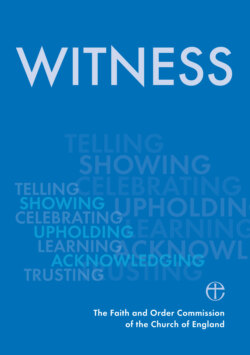Читать книгу Witness - The Faith and Order Commission - Страница 9
Pointing away
ОглавлениеWhen the Archbishop of Canterbury’s ‘Evangelism and Witness’ webpage expands on its initial definition (‘A witness is someone who simply says … what they have seen and heard for themselves’), it doesn’t offer a description of Christian activity. Instead, it focuses our attention on God. It says that ‘Every follower of Christ has witnessed for themselves the abundant love that God has for them.’6
Our activity as witnesses is not meant to draw people’s attention to ourselves, but to point people to God, to what God has done, to God’s work in their lives, and to God’s work in the world around them.
Christian witness could be thought of as joining in the song described in Psalm 96. In words and deeds, we ‘tell of God’s salvation from day to day’ and ‘Declare God’s glory among the nations, God’s marvellous works among all the peoples.’ If we want to ask how successful our witness is, its success will be measured by how well it sings that song – how richly, how fully, how compellingly it points people to God and God’s work.
That is why witness and worship are intimately knotted together. In worship, we turn our attention toward the God who meets us in Jesus. We face toward God in gratitude, adoration and delight, and in penitence, lament, and petition. In witness, we draw others’ attention in the same direction – calling them to look where we are looking. Worship makes witness possible; witness leads back to worship; and worship is itself a form of witness.
Witness therefore involves a balancing act. The people amongst whom we witness notice us – they see us and hear us – only in order to be pointed away from us. If our witnessing doesn’t attract any attention, it cannot be effective, but if it remains the focus of attention, it is not witness.
We see this balancing act in the interplay between witness’s multiple dimensions. The ‘Evangelism and Witness’ webpage says that ‘every one of us is sent in the power of the Holy Spirit to live lives and speak words’ which tell of what we have seen and heard – and witness is a matter of lives and words, working together.
Witness is a matter of showing the love of God to those around us. It is a matter of living in a way that shows that we believe the story of God’s gracious love to be true. It is a matter of living in a way that communicates something of that love to others.
It is also a matter of telling people of that love, which is always deeper and wider than anything we in our faltering love manage to show. We tell the story of a love greater than ours, a love on which we depend.
It is a matter of upholding the good news of God’s love in contexts where its existence and power are denied – of calling others (and ourselves) out of the unloving patterns of our lives.
It is a matter of celebrating all the places and the faces in which we find that love at work, all the occasions on which that love surprises us, appearing where we had least expected it.
It is a matter of acknowledging that all our witnessing fails to do justice to its source, and pointing people to the God upon whose gracious judgment, forgiveness, and teaching we depend.
It is a matter of learning to witness more fully, more truly – including from those amongst whom we witness, through whom God can show God’s gracious love to us in new ways.
It is a matter of trusting God to be God’s own witness, despite all our failures. God is at work by God’s Spirit, drawing people to Jesus, and though we are called to participate in that work, God’s loving grace is also at work before, apart from, and after anything we might do.
Our witness involves all these dimensions, interacting with one another and qualifying one another. It is not one simple activity, confined to one part of the lives we lead as followers of Jesus. It is one way of seeing the whole shape of those lives.
